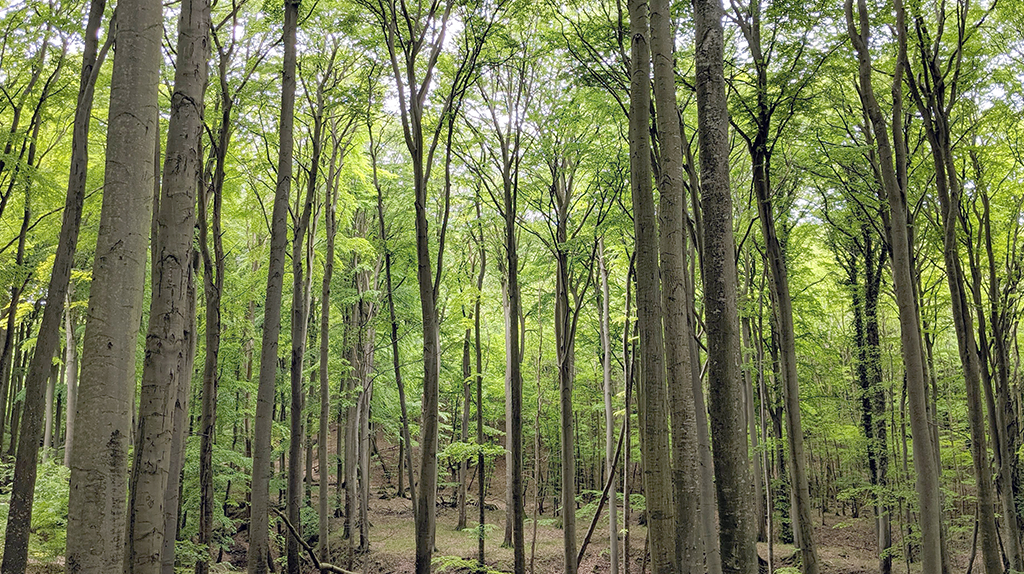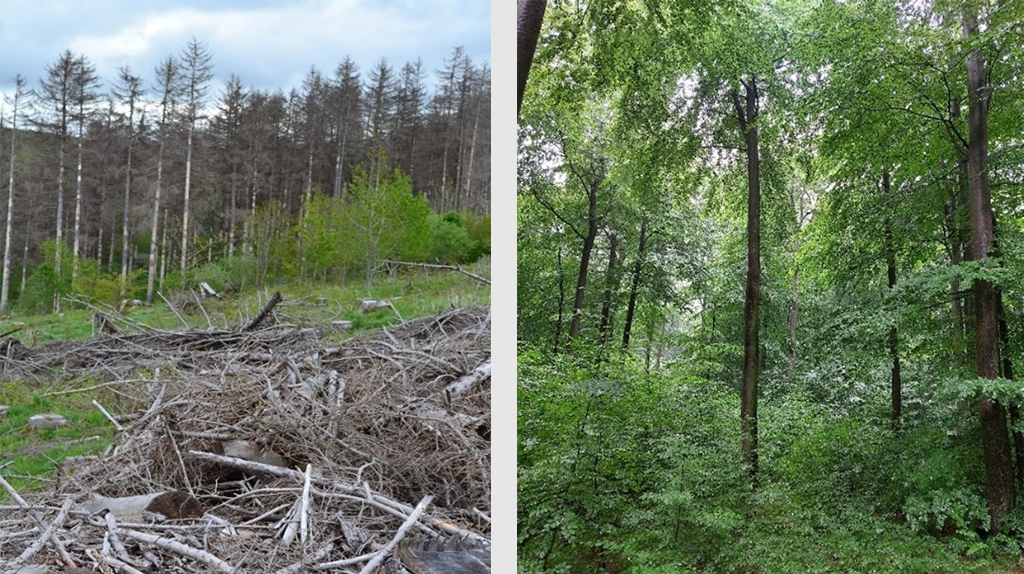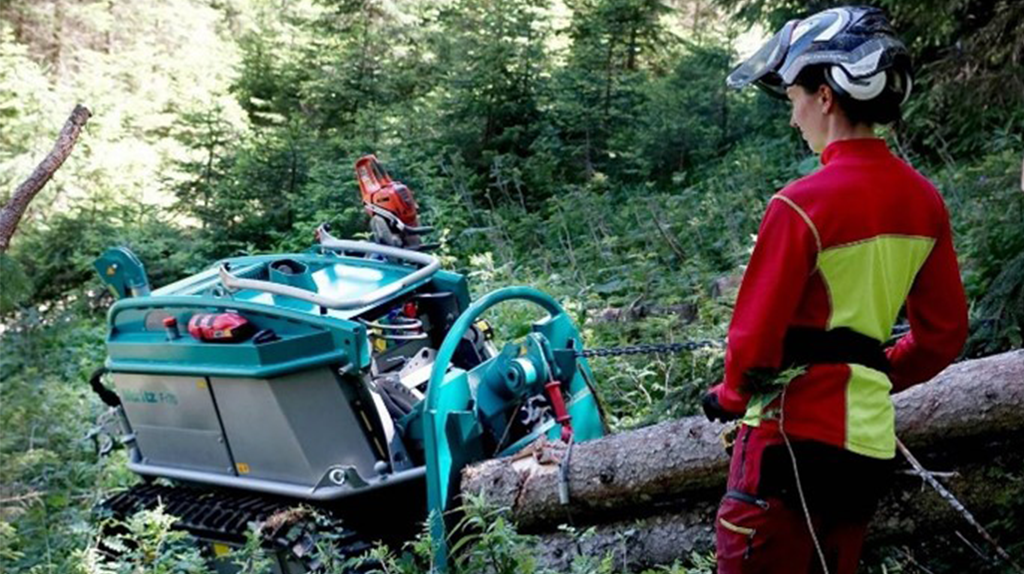
Near-natural forest conversion in times of climate change
- Project team:
Christoph Kehl (Project Manager),
Christoph Revermann - Thematic area:
- Topic initiative:
Committee on Food and Agriculture
- Analytical approach:
TA project
- Startdate:
2021
- Enddate:
2024
Why natural forest conversion is needed and how Germany can succeed

Summary
-
Climate change poses a significant threat to the integrity of forest ecosystems in Germany. In 2023, only approx. 20 % of the trees in Germany were classified as healthy. Satellite data show a loss of trees across an area of more than 500,000 hectares – which corresponds to approx. 5 % of the total forest area in Germany.
-
In order to prevent the progressive destabilisation of forest ecosystems, it is essential to convert forests into more diverse mixed forests. The choice of a near-natural form of forest management is crucial for increasing the structural and age diversity of forests and thus also for their adaptation to climate change.
-
In Germany, the initial situation for near-natural forest management varies considerably – depending on forest history, site conditions and the type of forest ownership. There is a need for forest conversion especially in privately owned pure stands of spruce and pine.
-
Targeted public funding for forest conversion in private forests as well as accompanying forestry advice based on a well-founded assessment of the pros and cons of different management concepts play a key role.
sprungmarken_marker_1783
What is involved
Forests are of major importance not only for timber production, but in particular for the conservation of biodiversity, for soil, groundwater and water protection as well as for local and global climate protection. However, they suffer particularly from the alterations caused by climate change, which challenge the self-regulating capacity of forest ecosystems. Especially pure stands that are not suited to the location (e. g. spruce and pine forests) are very risky, as they are more susceptible to damage caused by insects, storms or forest fires. In view of their poor condition and in order to prevent a possible further destabilisation of forest ecosystems, there is a broad consensus that a conversion of the forests to more near-natural mixed forests is indispensable.
Due to differing utilisation interests, scientific uncertainties and the high costs of extensive forest conversion, the possible ways of achieving a target-oriented implementation are controversial. One of the central lines of conflict relates to the question of the extent to which forests should be sustainably used or protected. It is clear that near-natural forest conversion is a very large and complex field of action that encompasses different, sometimes conflicting goals (nature conservation and species protection, climate protection and adaptation to climate change, sustainable use of resources, etc.), different levels of action as well as options for measures to be taken. Moreover, it requires a long-term, strategic approach. Heterogeneous ownership structures and management sizes as well as different utilisation interests and partly limited financial options for action of the owners are additional challenges. Altogether, whether the near-natural conversion of forests – which is likely to be a permanent task – succeeds in the long term depends to a large extent on how the economic and political framework conditions are designed.
Status quo and goals of near-natural forest conversion
Near-natural forest conversion involves the transformation from even-aged pure stands (partly consisting of non-natural tree species) to structured mixed forests that are as uneven-aged as possible. Meanwhile, forest conversion has become an objective and a subsidised element of almost all forestry strategies at federal and state level. According to calculations by the Thünen Institute of Forest Ecosystemsaround 2.2 million hectares of spruce forests and 620,000 hectares of beech forests in Germany urgently need to be converted into mixed forests. In addition, there are at least 500,000 hectares of damaged areas that are currently awaiting reforestation. In order to manage this need for forest conversion by about 2050, almost 100,000 hectares of forest would have to be adapted each year. Between 2000 and 2017, however, only around 22,000 hectares of forest were converted each year in Germany – across all types of forest ownership. This means that near-natural forest conversion must be accelerated significantly in the future.
The choice of a suitable silvicultural system is the crucial control parameter for increasing the structural and age diversity of forests and thus also for their adaptation to climate change. A forestry system encompasses all measures that take place at stand level – from regeneration and maintenance to the harvesting of trees. The most common type of forest management in Germany – especially in private forests – is still even-aged forest management, which is mainly based on economic criteria. It is usually carried out with fast-growing tree species, which primarily include coniferous trees (Fig. 1). In recent decades, however, alternative forms of management have also become established with the aim of converting even-aged pure stands to structured mixed forests that are as uneven-aged as possible. One of these management forms is the concept of the “continuous cover forest” (Fig. 2). Here, the aim is to create forests that are adapted to the site conditions and orientated towards the natural forest community. On the other hand, in the municipal forest of the German city of Lübeck, among others, a process-oriented forest management is used that focuses on the natural diversity and open-ended development of the forest. Here, the composition of the tree species and their age structure are largely left to nature. Only individual mature trees are felled.

Implications for forest management
The question of how to organise a suitable management of near-natural forestry or forest conversion is of particular relevance for forestry practice. Near-nature forest conversion must take into account the ecosystemic interrelationships, while at the same time it is a dynamic and rather open-ended process. Future changes in climate and growing conditions must be taken into account for forest management and reforestation without knowing exactly where, how and to what extent changes will take place. Thus, forest conversion and adaptation to climate change are becoming a continuous challenge.
Altogether, this leads to uncertainties with regard to a climate-resilient forest management that will yield the envisaged results. A central, but also controversially discussed question for forestry practice is whether a fundamental paradigm shift is needed – especially the large-scale set-aside of forest areas. Overall, there are strong indications that active forest management – provided it is carried out in a sustainable way – can significantly support forest conversion to more climate-stable forests. A careful use of wood contributes to forest management and can facilitate the establishment of structurally rich mixed forests, lead to reduced competition between trees and therefore favour a central concern with regard to adapting forests to climate change. Moreover, desirable regulating and supporting ecosystem services such as protection against natural hazards and recreation can be assured. The conservation of biodiversity can be ensured with a sensible mix of utilised forests and unused protected forest areas.
In Germany, forests still have good self-regulating capacities: After forest has disappeared, it is predominantly re-emerging on deforested areas. In order to reforest the extensive deforested areas in Germany, it therefore seems to be reasonable to make greater use of natural processes such as natural regeneration and to leave elements of the previous stand such as habitat trees and deadwood largely intact. However, especially in unfavourable conditions – e. g. lack of natural regeneration potential, overgrazing, excessive game populations – reforestation measures should be taken into consideration. It is important to minimise damage to the forest floor, as a functional forest floor is increasingly becoming an indispensable water and carbon store under climate change conditions.
Technical innovations
There are various technologies that offer a great potential for supporting near-natural forest conversion. The focus is on four specific fields of technology:
- Forest monitoring: Innovative monitoring approaches and methods, in particular satellite-based and drone-based sensor platforms as well as ground-based laser scanning, can generate valuable information about the success of the conversion, help with implementation control and create an objective basis for comparison.
- Innovative machine approaches to forest management: Here, the focus is on the targeted adaptation of machine components to the typical requirements of mixed forests – such as an optimised harvester head for both hardwood and softwood, an improved crane arm and innovative crawler vehicles with low ground pressure. Advances in sensor technology and IT also make it possible to establish more assistance systems to support machine operators (Fig. 3), which not only increases productivity but also allows more environmentally friendly processes to be introduced.

Fig. 3 Innovative assistance system - New possibilities in the field of biotic forest protection: In order to increase the resilience of forests for the future in a sustainable and environmentally friendly way and to guarantee a good health condition in the long term, the preventive possibilities – especially the monitoring and forecasting of insect pests – must be optimised and the development of new biological processes must also be driven forward.
- Genetic monitoring is intended to recognise changes in the genetic constitution of forest stands. By analysing particularly climate-resilient and stress-relevant characteristics of tree species, it provides important criteria for forest conversion measures and helps to identify and avoid risks, for example by evaluating seed quality.
All of these areas require further support. In order for innovations to be implemented in forestry practice, well-equipped companies with well-trained employees are needed – which is not the case to a sufficient degree. The forest ownership structure represents a certain obstacle to the adaptation of new technologies, because many small private forest owners are hardly financially capable of investing in technology. This means that especially small-scale forest owners are largely excluded from innovation. This shortcoming can be mitigated by government support and the increased involvement of forestry cooperatives.
Economic aspects
Forest conversion and the adaptation of forests to climate change are generally associated with high costs, which are caused, among other things, by the expenditure on forest conversion (e. g. reforestation or advance planting) and the reduced yields resulting from the conversion. In this context, the type of forest management – even-aged, continuous cover, process-oriented – not only has an impact on the speed of forest conversion into near-natural mixed forests, but also has major economic implications (see box below).
In Germany, the initial situation for near-natural forest management taking into account the adaptability of the forest to climate change varies considerably – depending on forest history, site conditions and the type of forest ownership. While forestry companies that have been applying near-natural forest management approaches for a long time already show a high diversity of tree species and structures and thus good prerequisites for adapting to climate change, other companies (especially in private forests) still have larger parts of the forest that are characterised by risky even-aged forest management with pure stands (mainly spruce and pine).
According to estimates, the total cost of forest conversion in Germany might amount to up to 40 billion euros by 2050. It is clear that many private forest owners will not be able to cope with this task without public funding. Targeted public funding for forest conversion as well as accompanying forestry advice based on a well-founded assessment of the advantages and disadvantages of different management concepts play a key role for the long-term success of forest conversion.
At present, however, political efforts to promote a change in the forestry sector still appear contradictory in some cases and comprise a variety of programmes and measures that address different levels. Finally, this also makes it difficult to make up the balance for individual measures – for example, which forestry funding contributes to climate/biodiversity protection and to what extent, if at all. In order to achieve a positive overall effect, the measures must be well coordinated. In addition to sufficient financial resources, forestry funding fundamentally requires a clear political objective and orientation, in which the central objectives of the individual strategies and the underlying funding measures are geared towards ensuring that the sustainability and public welfare orientation of forest use, the protection of biodiversity and important climate protection goals are not jeopardised. What is also needed is a long-term and adequately funded support programme for ecological or ecosystem-based forest conversion, which rewards the conversion to near-natural forests as unbureaucratically as possible – but on the basis of clear and verifiable criteria – and ensures that forest conversion activities are accelerated.
Results of silvicultural and forest management simulationsIn TAB working report no. 212, the economic implications of near-natural forest conversion were analysed using simulations that show possible paths of near-natural forest conversion as well as its short-term and long-term effects on the income situation of forestry companies. Four fictitious forestry companies were used as test objects: a state-owned forestry company in the northern growth region, a municipal company in the east and one private forestry company each in the south and west, which are intended to represent diversity in terms of site conditions, type of income (state forest, municipal forest, private forest) and company size. Moreover, the simulations differentiate between process-oriented forestry, continuous cover forestry (CCF) and even-aged forest management in all four forestry companies. The results show that process-oriented forestry and continuous cover forestry not only accelerate forest conversion, but that these forms of management are also economically more favourable in the medium to long term than even-aged forest management that has prevailed to date. Such simulations are inevitably associated with significant uncertainties. However, a comparison with similar analyses and long-term business economic surveys makes the results appear plausible – at least in general terms. An economic advantage of continuous cover and process-oriented forestry compared to even-aged forest management is the possibility of harvesting the trees individually according to their maturity and thus at the time of their maximum value growth. Moreover, the utilisation of natural processes in structured forests reduces forest management costs. This is why an early transformation of even-aged pure stands into structured mixed forests seems to make sense for the intended forest conversion, because the removal of strong, old trees can generate more revenues than the final use of an even-aged forest every 40 or 60 years. Uneven-aged continuous cover forests lead to more frequent, continuous, but somewhat lower revenues, while even-aged forests yield less frequent but higher revenues. |
Downloads
| |
TAB-Fokus no. 46 Near-natural forest conversion in times of climate change (PDF) The policy brief TAB-Fokus offers a compact overview of the content and results of our TA analyses on four pages.
|
|
TAB-Arbeitsbericht Nr. 212
This report provides a comprehensive overview of the scientific, technical, economic and legal aspects of near-natural forest reorganisation. In view of the urgency of this topic and the associated financial challenges for the forestry industry, particular emphasis is placed on the economic and forest management aspects. Both the current funding structures and the funding strategies based on them at federal and state level are analysed and reflected upon. In addition, possible courses of action and necessary measures are identified.
|
